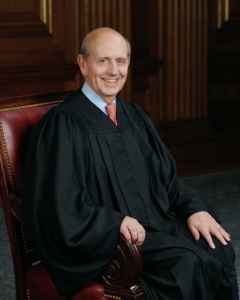Over the years, I’ve been fortunate enough to attend dozens of oral arguments in church-state cases at the U.S. Supreme Court.
When Justice Antonin Scalia was on the court, I’d wince just about every time he opened his mouth. Scalia had a tendency to question attorneys in an aggressive and acerbic manner, bordering on rude.
Justice Stephen G. Breyer was never like that. His questions were thoughtful, and his tone was always polite – even when you could tell he didn’t agree with the attorney arguing before the court.

Breyer, who announced his retirement last week, wasn’t a champion of strict separation of church and state. But he was with us more often than not, and even when he didn’t side with the perspective favored by Americans United, Breyer often took steps to craft a narrow position that at least attempted to mitigate damage to the church-state wall.
Consider Breyer’s position on religious symbols on public property. He tended to accept symbols that were erected many decades ago, arguing that they had become integrated into communities as quasi-secular landmarks (a view AU does not accept), but he opposed newly erected religious symbols.
Breyer thus voted with the majority in 2019 to allow a towering cross in Bladensburg, Md., that had been erected in 1925 to remain on public land, but he was careful to add, “Nor do I understand the Court’s opinion today to adopt a ‘history and tradition test’ that would permit any newly constructed religious memorial on public land. The Court appropriately ‘looks to history for guidance,’ but it upholds the constitutionality of the Peace Cross only after considering its particular historical context and its long-held place in the community. A newer memorial, erected under different circumstances, would not necessarily be permissible under this approach.”
On questions of taxpayer funding of religion, Breyer sought a middle ground. He voted to require Missouri to include a religious school in a program that funded renovations of school playgrounds, arguing that the program was a safety measure akin to police and fire protection (again, a view not shared by AU). But he opposed more substantial forms of government aid to religion. In a 2002 case in which the high court upheld private school vouchers, Breyer dissented, warning of the dangers of too much government involvement with religion. As America’s religious diversity expands, he asserted, public aid to religion becomes increasingly problematic.
In a 2014 case brought by Americans United, Breyer opposed the use of mostly Christian prayers to open city council meetings in Greece, N.Y. While Breyer did not write his own dissent, he joined one penned by Justice Elena Kagan that said in part, “I respectfully dissent from the Court’s opinion because I think the Town of Greece’s prayer practices violate that norm of religious equality – the breathtakingly generous constitutional idea that our public institutions belong no less to the Buddhist or Hindu than to the Methodist or Episcopalian.”
Breyer opposed any form of school-sponsored religion in public education and was a strong supporter of LGBTQ rights. He was skeptical of the idea that religious freedom grants a broad right for secular businesses to discriminate against certain customers.
Most recently, Breyer criticized the court majority when it ruled in favor of a New York church that sought to evade state-mandated curbs on large gatherings in light of the COVID-19 pandemic.
“[A]ccording to experts, the risk of transmission is higher when people are in close contact with one another for prolonged periods of time, particularly indoors or in other enclosed spaces,” Breyer wrote. “The nature of the epidemic, the spikes, the uncertainties, and the need for quick action, taken together, mean that the State has countervailing arguments based upon health, safety, and administrative considerations that must be balanced against the applicants’ First Amendment challenges.”
Breyer was a pragmatist who often sought to find ways to work toward consensus. Unfortunately, that approach is out of favor on an increasingly polarized court.
Justice Breyer’s perspective will be missed. We wish him all the best in his retirement.


